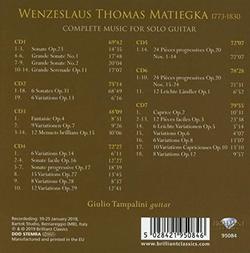| All Artists: Giulio Tampalini Title: Matiegka: Complete Music for Solo Guitar Members Wishing: 0 Total Copies: 0 Label: Brilliant Records Release Date: 5/3/2019 Album Type: Box set Genre: Classical Style: Number of Discs: 7 SwapaCD Credits: 7 |
Search - Giulio Tampalini :: Matiegka: Complete Music for Solo Guitar
 | Giulio Tampalini Matiegka: Complete Music for Solo Guitar Genre: Classical After wide-ranging surveys of guitar music in Spain and the Americas, Brilliant Classics has uncovered a largely forgotten but flourishing guitar culture in central Europe at the turn of the 19th century. A recent album de... more » |
Larger Image |
CD Details
Synopsis
Product Description
After wide-ranging surveys of guitar music in Spain and the Americas, Brilliant Classics has uncovered a largely forgotten but flourishing guitar culture in central Europe at the turn of the 19th century. A recent album dedicated to Johann Kaspar Mertz shone the spotlight on an early-Romantic figure writing tone-poems for the guitar just as Schumann was doing the same for the piano. His models and forbears had included Mauro Giuliani and the indefatigable Anton Diabelli. Their lesser-known contemporaries included Simon Molitor and the subject of this newly recorded compendium, Wenzeslaus Thomas Matiegka (1773-1830). Bohemian in origin, and born into a musical family, he studied music within the family before moving to Prague in the year of Mozarts death, 1791. Having graduated with a law degree, however, he moved to Vienna, studied composition more assiduously and encountered the fashionable guitar, which soon became his favorite instrument. By 1806 he was described as among the main exponents of the new Viennese guitar school. In that capacity Matiegka established for himself a successful career as a teacher, performer and composer, until his death from consumption at the age of 57. The works presented here illustrate his all-round gifts, satisfying as they do the varied purposes of teaching, entertainment, display and serious contemplation. The pair of grandes sonates on set certainly fulfill the requirements of the last aim, with a Schubertian breadth of phrase and contentment. The second album in this release is occupied by a set of Six Sonatas Op.31 which are cast in a lighter vein but still within the Classical structures formed and perfected by Haydn. Virtuoso brilliance is the order of the day on the third album, with its 12 Menuets Brillants, and a fantasia and variation set based on popular melodies. Album 4 includes both a Sonata facile and Sonate progressive aimed at students, as well as several more variation sets. Matiegkas work as a pedagogue also dominates albums 5 and 6 in the form of a progressive guitar method Op.24, and the collection comes to a delightful close with the composers Opus 1 a set of 12 Leichte Ländler and more variations, including an Op.12 set based on Mozarts Don Giovanni.
